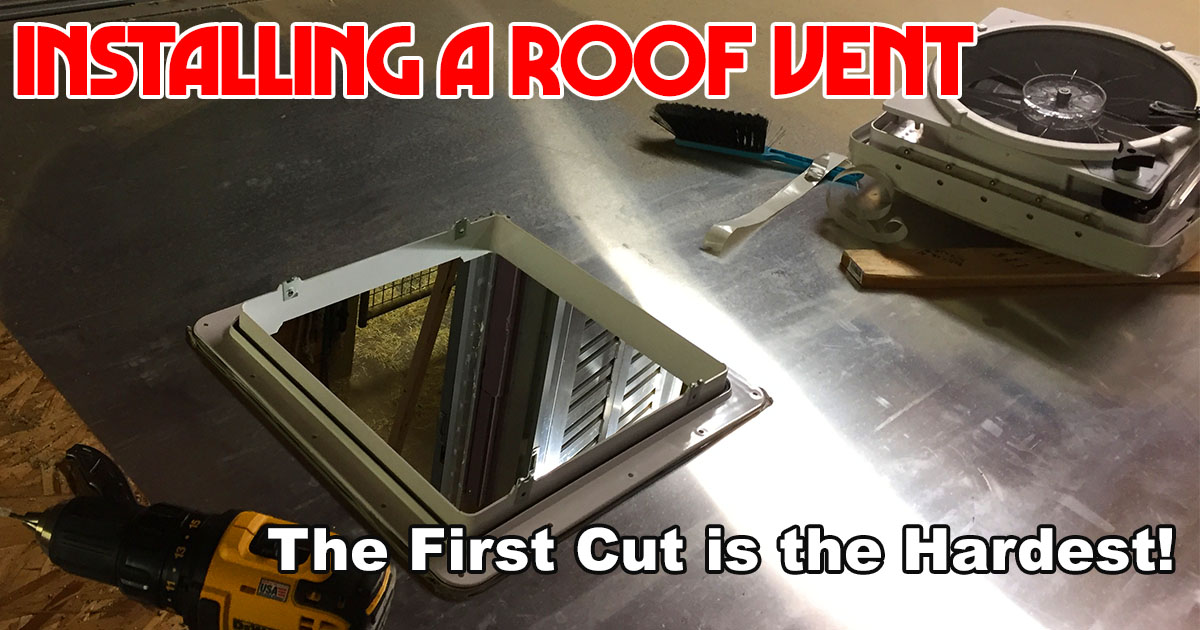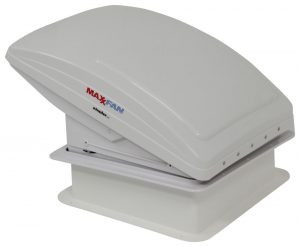Installing a Roof Vent – The first cut is the hardest!
One of the least sexy but most important additions to our horse trailer LQ build was the powered roof vent. It might not seem important at first, but without the fan, the “Taj MaSmall” would quickly become unbearable to live in. It keeps the air fresh, increases airflow, evacuates cooking odors and helps to control moisture. All very important items for a comfy abode away from home.
Installing the roof vent was also one of the scariest of all of the conversion tasks. Cutting a giant hole in a brand new trailer is, and should be, a little intimidating. Fortunately, it’s well within reach of any enthusiastic DIYer!
Let’s begin!
DISCLOSURE:
This post contains affiliate links, which means that if you click a product link and buy anything from the merchant, we will receive a small commission fee. This does not cost you anything. The price you pay remains the same, affiliate link or not.
Buying through these product links is the best way to say thanks if TrailMeister is of any help for you on the trail or in camp! Thank you for supporting TrailMeister and for keeping this website alive!
As I mentioned earlier, the idea of cutting a big hole in your roof is a bit intimidating, but once you get started the install is actually pretty easy.
What we installed: Maxxfan Deluxe 7000k
The Maxxfan Deluxe has a built in rain cover, a feature that is vital when you’re living in a small space, such as a trailer. Being able to keep the fan running when it’s raining is a key feature. The fan’s low power consumption allows us not to worry about the state of our batteries and indeed we let the fan run continuously throughout the night with no worries and plenty of juice for the next day.
TIME ON THE JOB: 3 hours – TOTAL COST : $350
The tools we used:
Maxxfan Deluxe 7000k with remote – (Info from Amazon)
Cordless drill – (Info from Amazon)
Caulk Gun – (Info from Amazon)
Screwdriver – (Info from Amazon)
Safety Glasses – (Info from Amazon)
Materials Used:
Butyl tape – (Info from Amazon)
Dicor Lap Sealant – (Info from Amazon)
Painters Tape – (Info from Amazon)
Isopropyl Alcohol – (Info from Amazon)
10 Steps to Fresh Air!
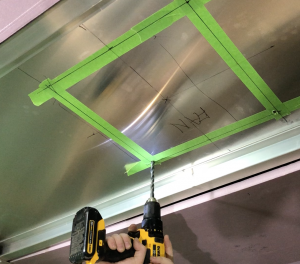 Step 1- Mark the fan cutout with painter’s tape
Step 1- Mark the fan cutout with painter’s tape
To mark the hole for the fan, we used the interior side of the roof vent trim piece to trace the shape onto the trailer roof and it was super easy!
Step 2 – Cut the hole with a jigsaw.
We started by drilling holes at each of the four corners and then used the jigsaw to connect the dots.
When you’re cutting out the hole a rainstorm of hot metal chips will fall on your face. WEAR PROTECTIVE GLASSES. You have been warned.
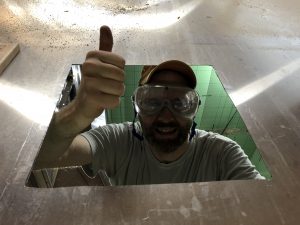 Step 3 – Marvel at the giant hole in your roof!
Step 3 – Marvel at the giant hole in your roof!
You just cut a whopping big hole in your new trailer! You deserve a beer but first let’s wrap this up. The rest is easy peasy!
Step 4 – Clean the roof surfaces with isopropyl alcohol
You’ll be using butyl tape to create a weather seal between the fan flange on the metal roof. A thorough cleaning of the surface makes sure that the weather stays outside.
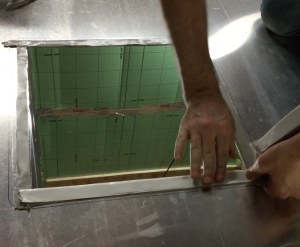 Step 5 – Apply butyl tape where the flange will sit
Step 5 – Apply butyl tape where the flange will sit
Step 6 – Install the roof flange
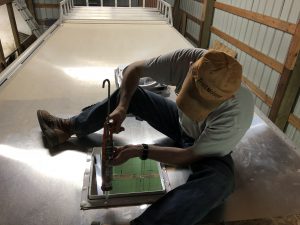 Step 7 -Apply Dicor self-leveling sealant
Step 7 -Apply Dicor self-leveling sealant
We covered the top of the screw heads and around the periphery of the flange
Step 8 – Install the Maxxfan unit
Set the fan on the flange and fasten using the 4 provided screws. Again, easy peasy!
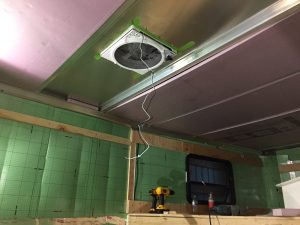 Step 9 – Look at the fan
Step 9 – Look at the fan
Just look at it. It’s beautiful. We have a roof vent!
Step 10 – Wire it to your power supply
Now have a beverage! You earned it!
After getting past the fears of messing up the hole, the installation was a simple task that anyone with a little confidence, time, and power tools can tackle. The instructions were clear and easy to follow and in short order the I had the fan mounted, wired and circulating fresh air.
For the the world’s largest directory of horse trails and camps to visit in your well ventilated horse trailer visit the trails section of the website! https://www.trailmeister.com/trails/


